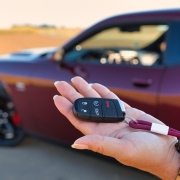When is a Used Car Too Old? What Buyers Need to Know
When buying a used car, one of the biggest questions that arises is: “How old is too old?” While purchasing a used vehicle can offer benefits such as lower prices, a wider selection of models, and potential savings on freight and taxes, age and condition play a crucial role in determining whether the car is a worthwhile investment.
Older cars may come with reliability concerns, outdated safety features, and higher maintenance costs. However, with proper research—including checking the vehicle’s history—buying an older car can still be a smart decision. Below, we’ll explore the key factors that help determine when a car may be considered “too old.”
Vehicle Safety: Are Older Cars Less Safe?
Safety should always be a priority when purchasing a used car. Generally, newer vehicles are designed with improved safety technologies, better crash structures, and advanced driver-assist features. If safety is a major concern, research when key safety features became standard and consider limiting your search to vehicles made after those dates.
- Airbags and Anti-Lock Brakes (ABS) – Dual airbags were not legally mandated in vehicles until 1998. ABS and side airbags only became common in the late 1990s and early 2000s.
- Electronic Stability Control (ESC) – Required in all new cars since 2012, ESC helps prevent skidding and loss of control, making it a critical safety feature.
- Crash Test Ratings – Older vehicles may not have undergone the same rigorous crash testing as newer models. Check safety ratings from organizations like the National Highway Traffic Safety Administration (NHTSA) and the Insurance Institute for Highway Safety (IIHS).
Reliability and Longevity: Can an Older Car Still Be Dependable?
A well-maintained car can remain reliable for many years, but age and mileage will inevitably impact its longevity. Here are some key considerations:
- Mileage vs. Age – While some argue that mileage is more important than age, the two factors go hand in hand. The average Canadian driver covers about 20,000 km per year, meaning a 10-year-old car has likely traveled around 200,000 km.
- Brand Reputation – Some brands are known for producing longer-lasting vehicles. Toyota and Honda, for example, have models that regularly exceed 300,000 km with proper maintenance.
- Parts Availability – The older the car, the harder it may be to find replacement parts. If a vehicle is more than 20 years old, sourcing specific components could become challenging and expensive.
Technology and Features: Are Older Cars Outdated?
Beyond safety, many buyers consider technology and convenience features when choosing a used car.
- Infotainment Systems – Bluetooth connectivity, touchscreen displays, and smartphone integration (Apple CarPlay, Android Auto) are relatively recent advancements found mostly in cars from the last five to seven years.
- Driver Assistance Features – Adaptive cruise control, lane-keeping assist, and automatic emergency braking are increasingly common in newer vehicles but are often missing from older models.
- Luxury Features – Features like heated seats, keyless entry, and automatic climate control were once reserved for luxury cars but are now available in many mainstream vehicles.
Maintenance and Repair Costs: Is an Old Car a Money Pit?
As vehicles age, they require more maintenance, and repair costs can add up quickly. Here are some of the expenses to consider:
- Routine Wear-and-Tear Items – Older cars are more likely to need replacements for brakes, tires, batteries, and suspension components.
- Major Repairs – If the car has over 150,000 km, it may be approaching costly repairs such as transmission rebuilds or engine overhauls.
- Fuel Efficiency – Older vehicles generally have worse fuel economy compared to modern models due to advancements in engine technology and aerodynamics.
Warranty and Protection: Do You Need One?
One of the advantages of buying a newer used car is the possibility of still being covered under the manufacturer’s warranty.
- Certified Pre-Owned (CPO) Vehicles – If you want warranty coverage but still prefer an older model, consider purchasing a CPO vehicle from a dealership. These cars undergo inspections and often come with extended warranties.
- Extended Warranty Plans – If you’re buying an older car with no remaining warranty, consider whether an extended warranty is worth the additional cost.
The Ideal Age for a Used Car: Finding the Sweet Spot
So, how old is too old? A balance between purchase price and long-term cost of ownership is crucial. Older cars may be cheaper upfront but could have higher maintenance expenses. The ideal used car age depends on your priorities:
- 1-3 Years Old – Nearly new with low mileage, still under warranty, and minimal maintenance required.
- 4-7 Years Old – A good balance of affordability, modern features, and reliability.
- 8-12 Years Old – More budget-friendly but may require increased maintenance.
- Over 12 Years Old – Riskier due to higher repair costs and outdated safety features.
Final Thoughts: Is an Old Used Car Right for You?
Determining whether a used car is “too old” depends on its condition, maintenance history, and your specific needs. While older vehicles can be a great deal, they also come with potential downsides, such as increased maintenance costs and outdated features.
To make an informed decision, always check the vehicle’s accident history, have a mechanic inspect it, and ensure it meets your safety and technology requirements. If budget constraints lead you to consider an older model, be prepared for the potential costs associated with ownership.
Ultimately, the right used car isn’t just about age—it’s about finding a well-maintained vehicle that fits your needs and budget.

